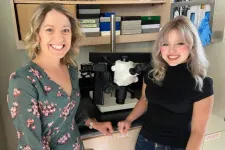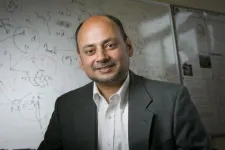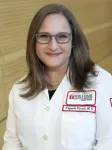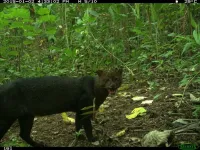(Press-News.org) If you’re trying to keep drivers from picking up their phones, make it a game, according to a new Proceedings of the National Academy of Sciences (PNAS) study led by researchers from the Perelman School of Medicine at the University of Pennsylvania. When drivers could earn points for making reductions in handheld phone use and had the chance to compete in a weekly leaderboard of others like them, researchers saw as much as a 28 percent reduction in handheld phone use while driving, a habit that stuck once the intervention—and the games—ended.
“Distracted driving is responsible for almost 1 million crashes in the United States each year. Interventions like this could start to bring that number down,” said study lead author Jeffrey Ebert, PhD, director of applied behavioral science at the Nudge Unit, part of Penn Medicine’s Center for Health Care Transformation & Innovation.
Previous work by Ebert and this study’s senior author, M. Kit Delgado, MD, MS, the faculty director of the Nudge Unit and an associate professor of Emergency Medicine, determined that a combination of interventions including weekly feedback and monetary incentives could result in significant reductions in handheld phone usage time—up to 21 percent. But the reductions declined as time wore on and the interventions ended.
On top of that, when looking at the results of the prior study, Ebert, Delgado, and their colleagues saw that the drivers with the heaviest phone use didn’t change their behavior. Given that only the safest drivers were eligible to receive congratulatory feedback and incentives in this prior study, the researchers concluded that the heaviest phone users may have gotten discouraged when they did not meet their lofty weekly goals.
“It’s like trying to get someone who has never run before to go out and do a marathon right away,” said Delgado. “Habit change is hard.”
With this in mind, Ebert and Delgado set out to test strategies that would make it easier to build good habits and reward drivers for making step-by-step improvements.
Like the one before, this study recruited customers enrolled in Progressive Insurance®’s voluntary “usage-based insurance (UBI)” program, a policy option where customers agree to download a smartphone app to monitor driving performance—including phone use while driving—with potential for discounts for safer driving. Customers who opted in to participate in the study were randomly assigned to one of four intervention strategies or a control group. All strategies involved giving drivers a hands-free cell phone mount for their car.
The group that combined the most interventions, including the points game, a share of a prize for earning enough points, and the leaderboard with added prize money, achieved a 28 percent reduction in time engaged in handheld phone use while driving.
That rate stayed the same when researchers followed up after the game and incentives were over, as long as 65 days afterward.
Even in the group where prize money wasn’t available, a 21 percent reduction in phone time was seen. They also maintained a significant decline in phone usage after their game ended, keeping it down by 16 percent.
“This tells me that a lot of people genuinely wanted to become safer, more focused drivers, and the study helped them develop lasting, good habits around their phone use,” Ebert said. “With a few tweaks to the feedback and incentive structure that insurance companies already employ, we believe you’ll see greater improvements in driver safety—a win-win-win for insurers, their customers, and society.”
The population that this occurred in was also encouraging.
“The fact that we tested these interventions within an auto insurer’s existing program suggests that they also could be scaled up quickly, especially since these types of behavior-based auto insurance programs are also rapidly growing across the U.S. and internationally,” Delgado said.
Each year in the United States, more than 800,000 crashes resulting in 400,000 injuries and 3,000 deaths are at least partly attributable to distracted driving. Cell phone use has been tied to approximately 12 percent of all crashes in the country. Handheld phone use amid driving also increases the odds of a crash ninefold. And although 28 states have now passed laws against handheld cell phone use while driving—with Pennsylvania being the most recent—these laws are difficult to enforce.
That means there needs to be other methods to encourage drivers not to use their phones so much, and Ebert, Delgado, and their colleagues believe behavioral science interventions like these are the answer.
“We see this as a proof of concept: When you offer drivers the knowledge, tools, and feedback needed to succeed, they are willing and able to give up a risky driving behavior for little or no money,” Ebert said.
The researchers are now investigating if these findings will translate to other safe driving habits, such as seat belt wearing or driving at safe speeds.
Funding for the research was provided by the Federal Highway Administration Exploratory Advanced Research Program (693JJ31750012), the National Institutes of Health (K23HD090272001), the Abramson Family Foundation, and the Progressive Casualty Insurance Company.
Editor’s note: Some of the study co-authors not affiliated with Penn Medicine work for Progressive.
END
To get drivers to put down their phones, make it a game
2024-07-29
ELSE PRESS RELEASES FROM THIS DATE:
Study identifies protein that affects health of gut microbiota and response to bacterial infection
2024-07-29
A study reported in Proceedings of the National Academy of Sciences (PNAS) shows how the presence of a specific protein called IL-22BP affects the composition of the gut microbiota and the body’s response to bacterial infection.
“We discovered that mice that don’t produce this protein are more protected against intestinal infections by bacteria like Clostridioides difficile and Citrobacter rodentium,” Marco Aurélio Ramirez Vinolo, a co-author of the article, told. He is a professor at the State University of Campinas’s Institute of Biology (IB-UNICAMP) in Brazil and head of its Immunoinflammation Laboratory.
IL-22BP ...
Fetal brain impacted when mom fights severe flu: New mouse study explains how
2024-07-29
URBANA, Ill. -- A bad case of the flu during pregnancy can increase the risk for fetal neurodevelopmental disorders such as schizophrenia and autism spectrum disorder. But it’s not the virus itself doing the damage; it’s the mother’s immune response.
New University of Illinois Urbana-Champaign research using live mouse-adapted influenza virus improves upon previous mouse experiments to explain the process on a cellular and molecular level. It also indicates fetal brain changes are more likely once the severity of the mother’s infection meets a specific threshold.
“Our data provide really compelling evidence for an infection severity ...
A camera trap for the invisible
2024-07-29
DURHAM, N.C. -- It sounds fantastical, but it’s a reality for the scientists who work at the world’s largest particle collider:
In an underground tunnel some 350 feet beneath the France–Switzerland border, a huge device called the Large Hadron Collider sends beams of protons smashing into each other at nearly the speed of light, creating tiny eruptions that mimic the conditions that existed immediately after the Big Bang.
Scientists like Duke physicist Ashutosh Kotwal think the subatomic debris of these collisions could contain hints ...
Neurodivergent children are twice as likely to experience chronic disabling fatigue in adolescence
2024-07-29
The research, led by Dr Lisa Quadt, Research Fellow in Psychiatry at BSMS and Dr Jessica Eccles, Reader in Brain-Body Medicine at BSMS, highlights a significant link between neurodivergence and chronic fatigue. The study found that increased inflammation in childhood, often resulting from heightened stress levels, may be a contributing factor. This supports previous findings that suggest chronic fatigue can be rooted in inflammatory processes.
“These results show the importance of trans-diagnostic screening for children and the need for better support for neurodivergent children” says Dr Quadt. “Children with neurodivergent ...
Engineers use data to manage grid transformers, boosting reliability to homes, farms
2024-07-29
AMES, Iowa – Pay attention the next time you drive near your home, farm or business. You’ll notice small, green utility boxes all over the place. They’re distribution transformers. If they’re not working properly, electricity won’t flow to your lights and appliances.
Those boxes take kilovolts of electricity (that’s high voltage, measured in 1,000s of volts) from transmission lines and step it down to the safer, practical 120 or 240 volts that power our daily lives.
“Utilities have plenty of them,” said Zhaoyu Wang, an Iowa State University professor of electrical and computer engineering. “Most of them only ...
PSU awarded $1.9M NOAA grant to address microplastic pollution in coastal communities
2024-07-29
Portland State University (PSU) has been awarded $1,976,806 from the National Oceanic and Atmospheric Administration's (NOAA) National Sea Grant Marine Debris Challenge Award Program to lead an innovative and collaborative three-year project to address microplastic pollution on the Oregon coast.
This grant is part of a $27 million project between the U.S. Department of Commerce and NOAA. Portland State will host one of 11 projects that received a total of $25 million in funding across Alabama, California, Florida, Illinois, Massachusetts, New York, North Carolina, Oregon, Texas and Wisconsin. These projects ...
Association for Molecular Pathology announces 2024 award recipients
2024-07-29
ROCKVILLE, Md. – July 29, 2024 – The Association for Molecular Pathology (AMP), the premier global molecular diagnostic professional society, today announced the recipients of this year’s Excellence in Molecular Diagnostics, Jeffrey A. Kant Leadership, and Meritorious Service Awards. These prestigious accolades will be presented to the winners this November during AMP’s 2024 Annual Meeting & Expo in Vancouver, British Columbia.
Award for Excellence in Molecular Diagnostics
Atul Butte, MD, PhD
Priscilla Chan and Mark Zuckerberg Distinguished ...
Mutations in DNA damage repair genes associated with response to cisplatin in bladder cancer: Prospective validation from SWOG S1314 trial
2024-07-29
An analysis of pre-treatment tumor specimens from 105 patients with localized muscle-invasive bladder cancer found that the presence of a mutation in any one of three genes, all known to be involved in DNA damage repair, was associated with complete pathologic response to cisplatin-based neoadjuvant chemotherapy as measured by pathological downstaging at the time of bladder surgery. Results are published in the journal European Urology.
“The SWOG S8710 randomized trial provided Level 1 evidence supporting ...
Timber plantations near urbanized areas support the movement of small and medium-sized terrestrial mammals between patches of natural forest
2024-07-29
In the fight to mitigate climate change and deforestation in the tropics, timber plantations have emerged as a promising strategy for reforesting degraded land and connecting patches of natural forest. Often, these are species with commercial value for landowners but are not native to the region. To evaluate how well non-native tree plantations support native wildlife in heavily human-impacted areas, researchers from the Smithsonian Tropical Research Institute (STRI), the Max Planck Institute of Animal Behavior (MPI-AB), Wageningen University & Research, and the University of California – Davis surveyed over 200 hectares of timber plantations ...
Wang receives funding for Experiential Learning Program
2024-07-29
Wang Receives Funding For Experiential Learning Program
Zhengdao Wang, Professor, Cybersecurity Engineering, College of Engineering and Computing (CEC), received $14,000 from Old Dominion Research Foundation for: “CCI—2024 Experiential Learning Program/Water System Infrastructure - Innovative Experiential Learning.”
Wang intends to enhance awareness and understanding of cybersecurity risks associated with public water systems by developing an educational simulation game, "CyberShield H2O."
He will provide ...




